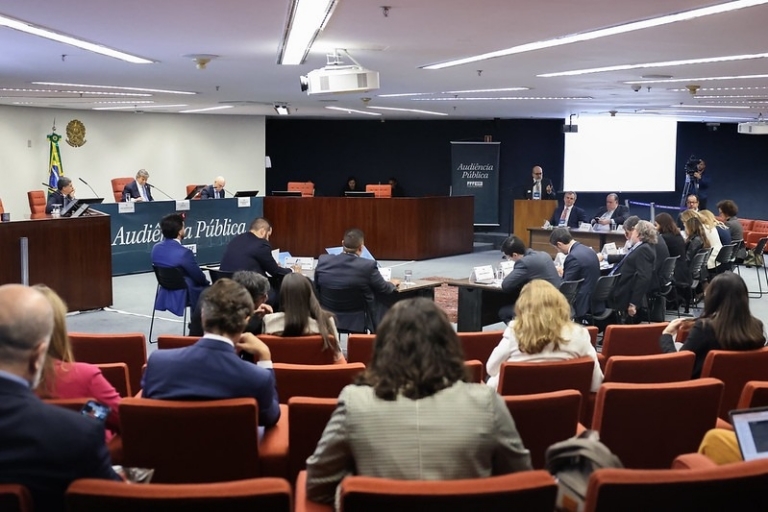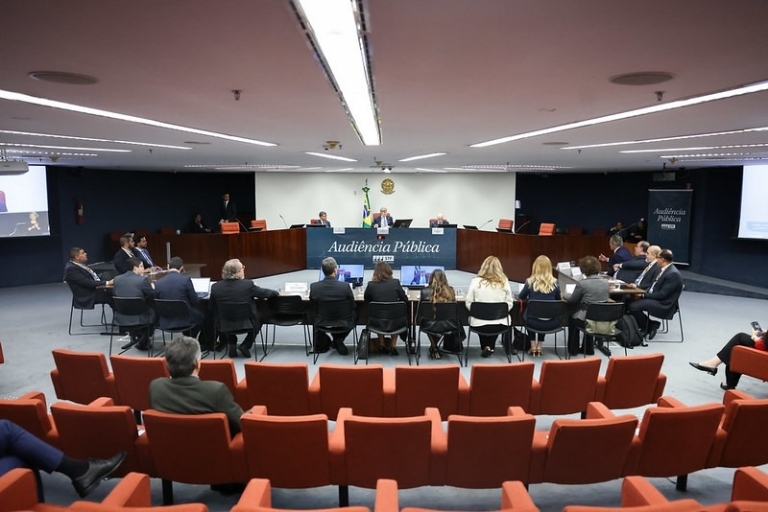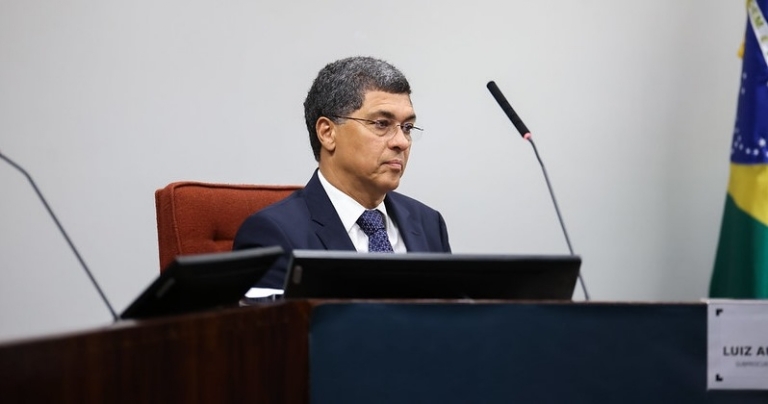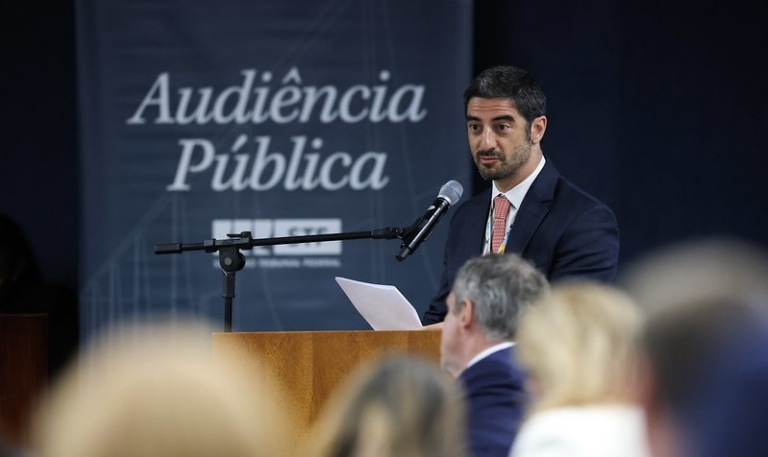

At the end of the meeting, Luiz Fux emphasized that the decision to be made by the Supreme Federal Court will consider all values discussed during the two days. He expressed being deeply impressed by the various aspects presented by the speakers and noted that, once the judiciary is called upon, it is obligated to provide a solution.
“We were asked to decide on an issue in which we have no expertise, hence the need to listen to experts through a public hearing,” he highlighted.

Here is a summary of what was said on Tuesday (12):
Terence Zveiter and Paulo Sérgio Feuz, from the National Academy of Sports Law (ANDD)
The organization sees the law as a “promising future” for Brazil in terms of revenue, arguing that the issues caused by betting are minimal compared to the benefits that the revenue will bring. They emphasized the need to regulate against match-fixing to protect the integrity of competitions.
Eduardo Rocha Dias, from the University of Fortaleza (Unifor)
The professor from the Graduate Program in Law discussed ongoing research on the prevention and consequences of pathological gambling, treating it as a public health issue. He highlighted the behavioral addiction aspects of gambling, mentioning its severe consequences like debt, parental neglect, violence, crime, depression, and high suicide rates. He advocated for a total ban on gambling advertisements and sponsorships.
Leonardo Ribeiro Pessoa, from the Brazilian Institute for Business and Tax Law Studies (Ibedet)
He called for improvements to the Betting Law to safeguard economically vulnerable populations. Citing data, he pointed out significant indebtedness among marginalized groups, particularly affecting the Black community. He also noted the mental health impact of online gambling, especially on young people, raising anxiety and depression rates.

Ione Amorim, from the Brazilian Institute of Consumer Protection (Idec)
The consultant presented data explaining the proliferation of betting in Brazil over the past five years, attributing it to factors like the pandemic-induced isolation, technological advancements, weak and delayed regulation, misleading advertising, and the role of influencers in promotions. She mentioned that betting leads the ranking of complaints to consumer protection agencies, with over 366,000 grievances in six months.
Mariel Angeli Lopes, from the Inter-Union Department of Statistics and Socioeconomic Studies (Dieese)
She highlighted the negative mental health impacts of online betting, particularly on vulnerable workers. Noting a significant increase in betting during the pandemic, she explained that people often gamble not for fun but as a desperate attempt to earn extra income, as they are already in debt. She warned about creating a generation of compulsive gamblers.
Fabíola Xavier, from the Retail Development Institute (IDV)
The executive director expressed concern from the retail sector about the growing online betting market. She emphasized that funds directed to gambling are diverted from the broader economy, impacting retail, which is crucial for generating numerous jobs.
Rosana Lúcia Alves, from the National Association of Retirees, People with Disabilities, Seniors, Pensioners, and Social Security Insured (Anadips)
She emphasized the addiction caused by gambling, known as gambling disorder, recognized by the World Health Organization (WHO). Alves criticized the government's focus on increasing revenue through online betting without a public policy discussion to prevent and treat gambling addiction within the national health system.

Maíra Fernandes, from the Brazilian Association of Criminal Lawyers (Abracrim)
As the chair of the association’s Economic Criminal Law Committee, she pointed out Brazil's drastic shift from a formerly prohibitive stance on gambling to an almost fully permissive one. She advocated for regulation comparable to the control over alcohol and tobacco, noting that the Betting Law provides legal certainty but needs enhancements, particularly for anti-money laundering measures. Without regulation, she argued, the gambling sector risks slipping into illegality.
Thiago Henrique Cunha Basílio, from the Public Defender's Office of Rio de Janeiro
The public defender and deputy coordinator of the Consumer Defense Nucleus stated that his office assists consumers exposed to the online betting market daily. Drawing from this experience, he identified primary issues such as financial harm (impacting family incomes), psychological damages, effects on children and teenagers, and advertising practices. He emphasized that betting is a high-risk activity that should not be normalized.
Antônio Carlos de Almeida Castro, representing Cruzeiro Esporte Clube
The lawyer underscored the significance of betting sponsorships for football, a crucial economic sector. He warned that removing betting advertisements and sponsorships would severely harm both major and minor clubs, declaring that suspending the law would signify “the end of football.” He also noted that, before the current regulation, thousands of companies operated without oversight.
Jonas Decorte Marmello, from Botafogo de Futebol e Regatas
The club’s executive vice president highlighted that the football industry's growth over the past six years coincides with the rise of online betting in Brazil. He pointed to the “injection of capital” from these new players as a vital factor in bolstering the sport, which previously relied on state funding. He added that the top 20 Serie A clubs are projected to generate over R$ 12 billion, reflecting a 40% increase in revenue during this period.

André Carvalho Sica, from Fluminense Futebol Clube
The lawyer presented a manifesto signed by 30 clubs from various regions and divisions of Brazilian football in support of the Betting Law. He emphasized that betting companies provide the largest sources of revenue for football. According to Sica, the arrival of betting operators in Brazil brought challenges like uncollected taxes, match-fixing, and unauthorized use of club brands. He further stressed that betting revenue is crucial for funding women’s football and sponsors 19 of the 20 Serie A men’s teams.
Mateus Fernandes Vilela Lima, from the Federal Senate
The Senate lawyer described the Betting Law as the product of a legislative process marked by extensive debate, which enabled Parliament to create a framework that balances economic freedom and public protection. Despite acknowledging the negative impact of online betting on Brazilians' lives, he mentioned the Senate’s establishment of a Parliamentary Inquiry Commission (CPI) on Bets to assess the sector's repercussions and develop regulations to mitigate the issues.
Carlos Manuel Baigorri, from the National Telecommunications Agency (Anatel)
The agency president emphasized that effective regulation of services and economic activities requires state capability to enforce established rules. He stressed that for the Betting Law to work and irregular companies to face penalties, the government needs technological resources and administrative expertise. He explained that blocking platforms is not solely the responsibility of telecommunications companies because digital ecosystems have means to bypass restrictions. Therefore, he advocated for new tools to enable Anatel and the Ministry of Finance's Secretariat of Prizes and Bets to act efficiently.
Source: GMB / STF